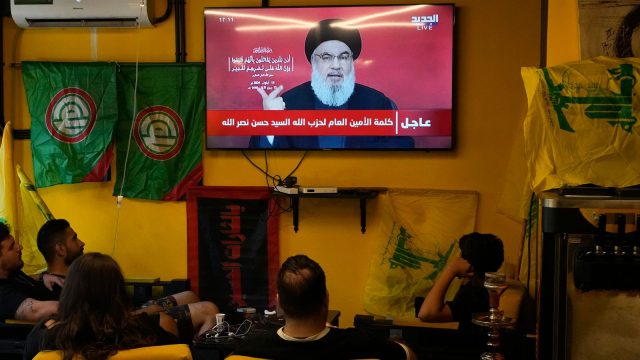Hassan Nasrallah’s speech was calm and even candid at times – but the Secretary-General of Hezbollah was largely defiant and uncompromising as he addressed the embarrassing nature of this week’s trojan-horse style attacks – and the posture of the Iran-backed Shia group in the weeks ahead.
The key points centred on two separate – but ultimately related – threats.
First, he promised a war-like response to the pagers and walkie-talkie attacks which have killed 37 and injured thousands in Lebanon.
He blamed the operations on Israel and said they “crossed all the red lines”.
Middle East latest: Britons warned to leave Lebanon
They would be met, he said, “with a just punishment”.
He added: “When, where, how? You’ll know when the time comes. We won’t talk about it here.”
Mr Nasrallah was unwilling to spell out exactly what he meant but it was clear that he is prepared for a major intensification of the conflict with Israel in and around the southern Lebanese border.
Both sides have been waging a tit-for-tat struggle that began last October when Hezbollah opened fire with rockets and missiles in solidarity with Hamas.
Mr Nasrallah warned viewers to be in no doubt that 60,000 displaced Israeli residents will not return to their homes.
“Do what you want, you won’t be able to return them,” he said. “Neither military escalation, murder, nor an all-out war will bring your settlers and inhabitants back to the border. You know this.”
While Hezbollah can muster tens of thousands of experienced fighters, Mr Nasrallah knows they would struggle in a conventional war with a technologically superior force – as this week’s attacks have helped to prove.
However, a major Israeli incursion into southern Lebanon could change the odds. The terrain is mountainous and the Israel Defence Forces (IDF) would be fighting on the enemy’s turf.
So far, Israel’s leaders seem reluctant to go down this path.
Read more:
Hezbollah leader – pager explosions ‘an unprecedented blow’
Exploding tech ‘a warning to governments’
However, they were not going to let Mr Nasrallah make his speech without making their presence felt.
Midway through his address, which was broadcast around the country on national television, a massive sonic boom rang over Beirut as a fighter jet broke the sound barrier.
It was a reminder, if one were necessary, that the Israelis are close – and the cost of war is high.























